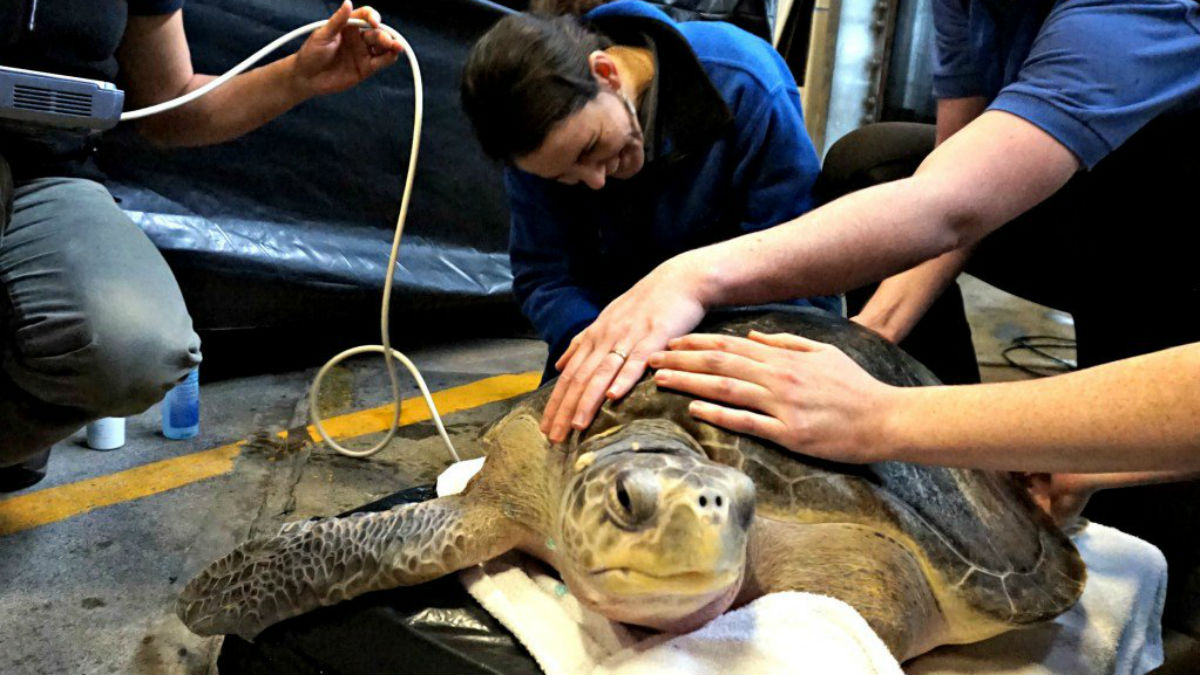Turtle with 'the bends' treated in oxygen chamber
Tucker the sea turtle undergoes procedure used on divers after becoming too buoyant

A free daily email with the biggest news stories of the day – and the best features from TheWeek.com
You are now subscribed
Your newsletter sign-up was successful
A rescued turtle that cannot go underwater because of excessive gas bubbles is undergoing treatment in a hyperbaric chamber used on scuba divers suffering 'the bends'.
Tucker, a 20-year-old sea turtle from the endangered olive ridley species, was rescued in December after being washed ashore on the coast of Oregon, far from his natural stomping grounds in southern California and Mexico. Marine experts believe he was knocked off course by December storms, and drifted into colder waters, developing hypothermia and pneumonia in the process.
After three months of painstaking care from the staff at the Seattle Aquarium, Tucker has made a full recovery – with one exception. A build-up of nitrogen bubbles in his body means that he cannot dive or swim underwater, skills vital for finding food in the wild.
The Week
Escape your echo chamber. Get the facts behind the news, plus analysis from multiple perspectives.

Sign up for The Week's Free Newsletters
From our morning news briefing to a weekly Good News Newsletter, get the best of The Week delivered directly to your inbox.
From our morning news briefing to a weekly Good News Newsletter, get the best of The Week delivered directly to your inbox.
Seattle Aquarium spokesman Tim Kuniholm explained that internal gas bubbles were acting as a kind of lifejacket, making the 32kg (5st) turtle too buoyant to stay beneath the surface.
In humans, these nitrogen bubbles can form when scuba divers ascend too quickly, resulting in what is known as decompression sickness or 'the bends'. Symptoms commonly include joint pain, nausea, and numbness, and can occasionally even be fatal.
Tucker has the honour of being the first non-human patient to be treated in Virginia Mason Hospital's hyperbaric chamber. Inside the pressurised chamber, patients suffering from decompression sickness breathe in pure oxygen for two hours at a time. The combination of air pressure and high volumes of oxygen is designed to push out the gas bubbles.
"He could remain in human care, but that's not our goal," Kuniholm said. Instead, if the tests show the procedure has been a success, staff are hoping to release a newly pressurised Tucker into the warm waters off San Diego, California.
A free daily email with the biggest news stories of the day – and the best features from TheWeek.com
-
 Film reviews: ‘Wuthering Heights,’ ‘Good Luck, Have Fun, Don’t Die,’ and ‘Sirat’
Film reviews: ‘Wuthering Heights,’ ‘Good Luck, Have Fun, Don’t Die,’ and ‘Sirat’Feature An inconvenient love torments a would-be couple, a gonzo time traveler seeks to save humanity from AI, and a father’s desperate search goes deeply sideways
-
 Political cartoons for February 16
Political cartoons for February 16Cartoons Monday’s political cartoons include President's Day, a valentine from the Epstein files, and more
-
 Regent Hong Kong: a tranquil haven with a prime waterfront spot
Regent Hong Kong: a tranquil haven with a prime waterfront spotThe Week Recommends The trendy hotel recently underwent an extensive two-year revamp
-
 Epstein files topple law CEO, roil UK government
Epstein files topple law CEO, roil UK governmentSpeed Read Peter Mandelson, Britain’s former ambassador to the US, is caught up in the scandal
-
 Iran and US prepare to meet after skirmishes
Iran and US prepare to meet after skirmishesSpeed Read The incident comes amid heightened tensions in the Middle East
-
 Israel retrieves final hostage’s body from Gaza
Israel retrieves final hostage’s body from GazaSpeed Read The 24-year-old police officer was killed during the initial Hamas attack
-
 China’s Xi targets top general in growing purge
China’s Xi targets top general in growing purgeSpeed Read Zhang Youxia is being investigated over ‘grave violations’ of the law
-
 Panama and Canada are negotiating over a crucial copper mine
Panama and Canada are negotiating over a crucial copper mineIn the Spotlight Panama is set to make a final decision on the mine this summer
-
 Why Greenland’s natural resources are nearly impossible to mine
Why Greenland’s natural resources are nearly impossible to mineThe Explainer The country’s natural landscape makes the task extremely difficult
-
 Iran cuts internet as protests escalate
Iran cuts internet as protests escalateSpeed Reada Government buildings across the country have been set on fire
-
 US nabs ‘shadow’ tanker claimed by Russia
US nabs ‘shadow’ tanker claimed by RussiaSpeed Read The ship was one of two vessels seized by the US military